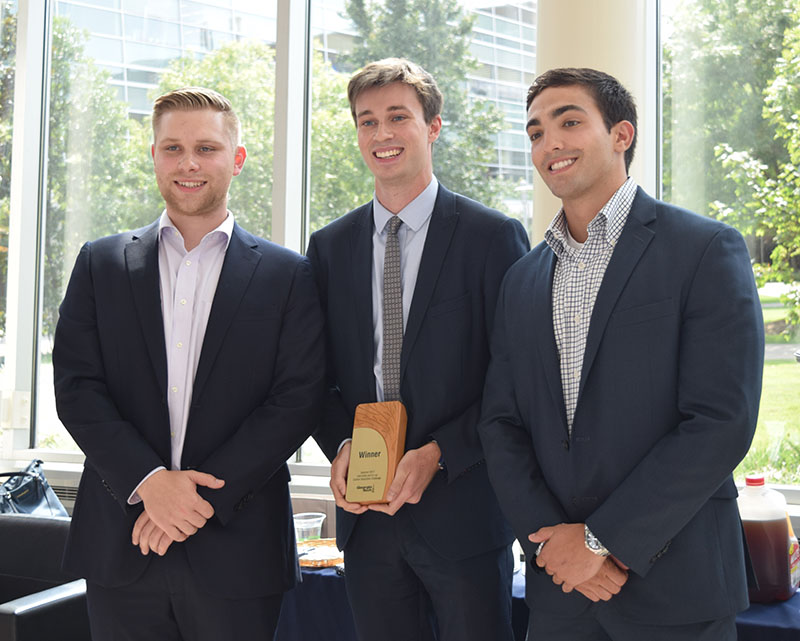A team composed of two Scheller College of Business and four Industrial and Systems Engineering students who interned this summer at SunTrust won the top prize in the inaugural Internship and Co-op Carbon Reduction Challenge.
Students who voluntarily signed up for the program agreed to serve as sustainability ambassadors in their company or organization. More specifically, they accepted the challenge to propose and implement plans to reduce carbon emissions at their place of employment while also cutting costs for their employer. The cohort included more than 20 students from four colleges within Georgia Tech who worked on projects at more than ten organizations, including several Fortune 500 companies, prominent NGOs, and the City of Atlanta. Several projects have already been approved, which will collectively result in over 12 million pounds of CO2 emissions reductions and hundreds of thousands of dollars in estimated savings.
The Internship and Co-op Carbon Reduction Challenge represents an innovative co-curricular initiative between the Scheller College of Business and the College of Sciences. Beril Toktay, Scheller College Professor and faculty director of the Ray C. Anderson Center for Sustainable Business, and Kim Cobb, College of Sciences Professor, partnered to adapt Professor Cobb’s long-running Carbon Reduction Challenge class project to the internship and co-op program. With this new structure, students engage with the challenge on their own initiative in addition to their full-time internship roles in areas such as business analysis, IT, research, and engineering support. This experience helps them see that they can commit to promoting sustainable business practices no matter what position they hold at a company, which the two professors believe will be transformative in preparing them to become tomorrow’s change makers.
The judges commended all the participants on their dedication to their projects. The team singled out for having made the most comprehensive impact in carbon reduction for their company was the SunTrust team, which included Scheller College of Business students William Courreges-Clercq and Sam Rubin, and Industrial and Systems Engineering students Anjani Agrawal, Alex Ketchum, Nicholas Rogstad, and Mario Wijaya. The winning team devised a three-pronged approach for reducing carbon emissions via recommendations related to SunTrust employee travel. Their suggestions included switching the default option for rental cars from intermediate to economy class, and purchasing "Skype for Business" approved devices that vastly improve audio quality for conference calls, thus reducing employee travel for face-to-face meetings. The student team presented their proposal to the highest levels of SunTrust leadership, and the rental car proposal was implemented the same day, immediately reducing SunTrust’s CO2 footprint while improving their bottom line.
The runner-up prize was awarded to the Delta Air Lines team (Emma Brodzik, Elizabeth Jang, Tyler Matthews, and Isabella Plonk) for their proposal to add additional aircraft to the jet engine washing program in order to make those engines run more efficiently. Honorable mentions went to Joseph Buehler (Alcon Laboratories, Inc.), Aditya Thakur (Volkswagen), and Alexandre Poux (BP), for lighting upgrades in commercial and manufacturing facilities, and the introduction of reusable lunch containers, respectively, all of which were approved for implementation.
The Challenge is funded by a grant from the Ray C. Anderson Foundation’s NextGen Committee and the Scheller College Dean’s Innovation Fund and is an affiliated project of the Georgia Tech Center for Serve-Learn-Sustain.
